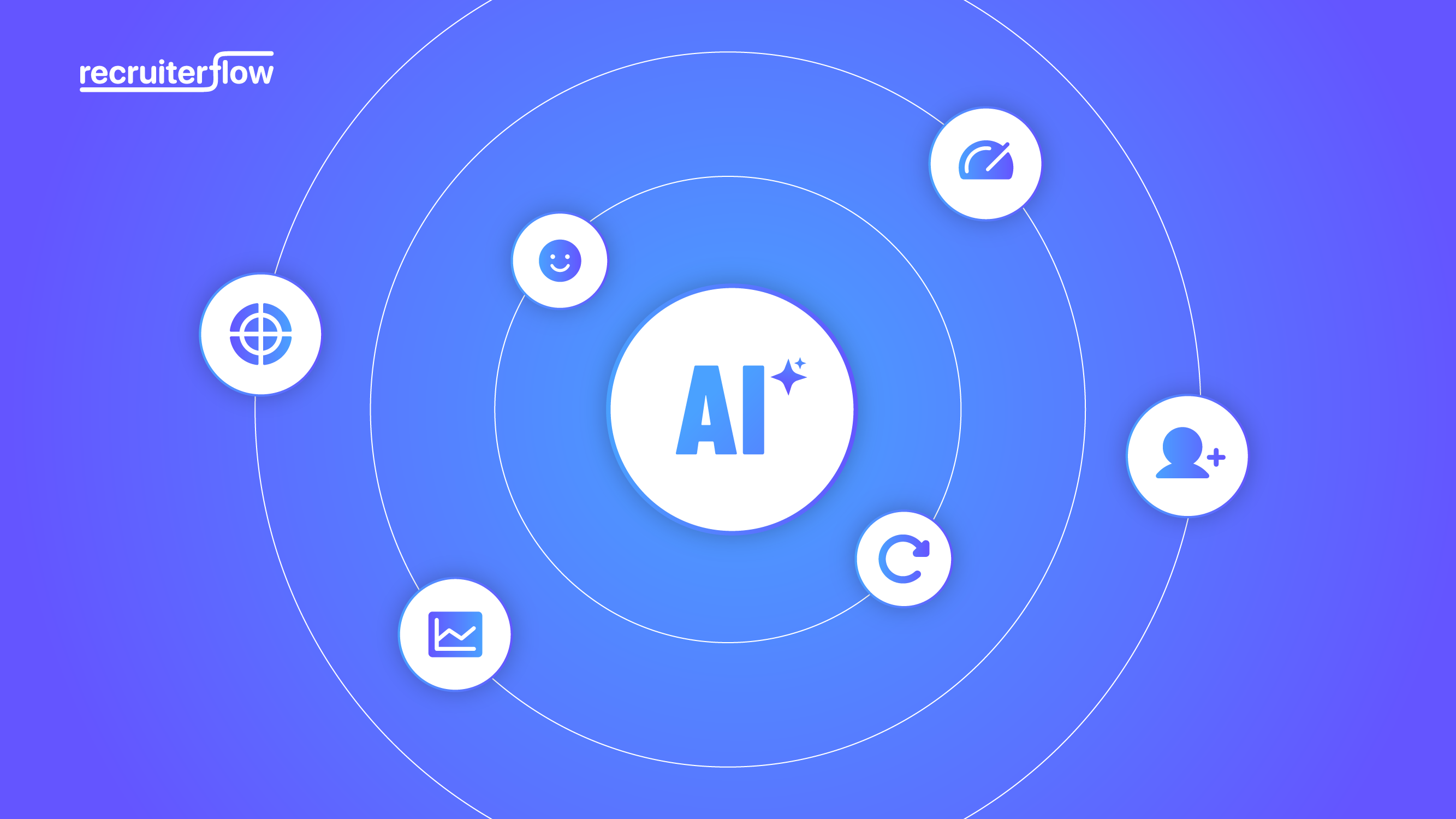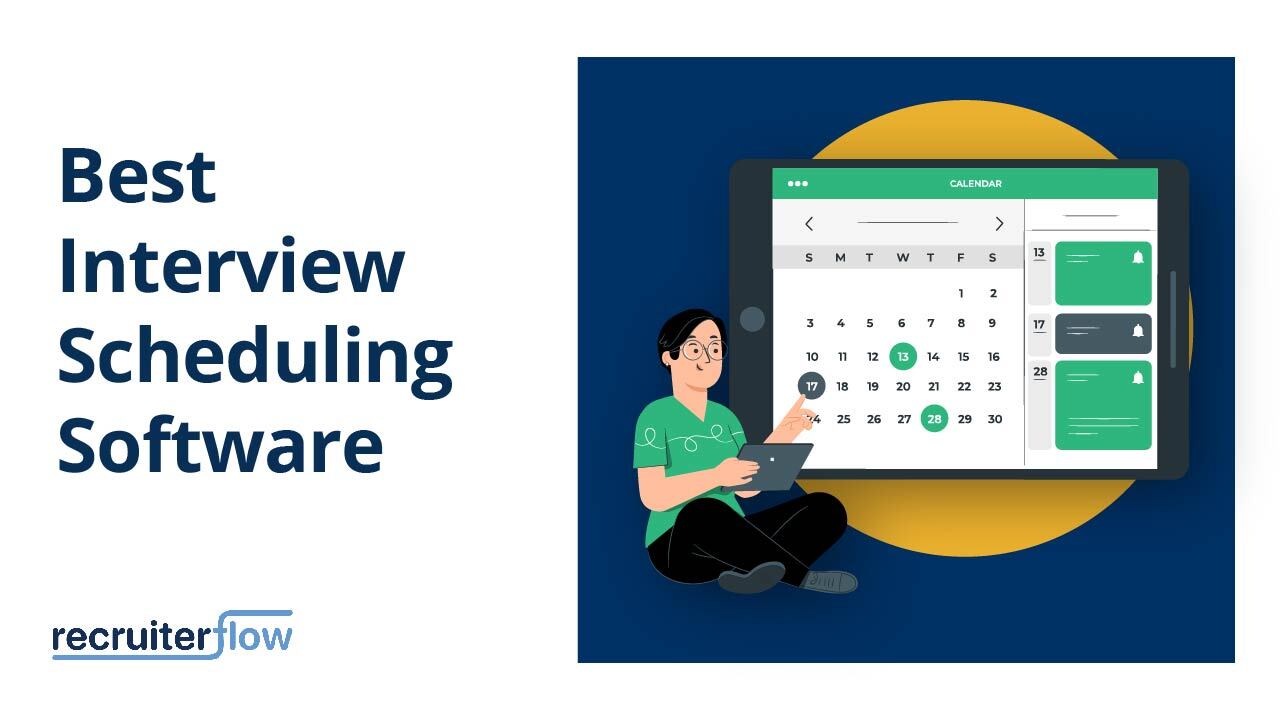
The Complete Recruiter Hiring Guide for 2026

If you’re running a recruitment/staffing agency, you know the close connection between the quality of recruiters you hire and your company’s success. Good recruiters bring the right candidates to the right roles, but the challenge is to find that great recruiter and hire them in the first place.
This article will dive into the nuances of hiring a top-notch recruiter—reasons to do so, requisite skills and qualifications, steps actually to hire the recruiter, and a few best practices to make things easier.
If you are Googling phrases like “how to hire a headhunter recruiter” or “how to hire a good recruiter,” this recruiter hiring guide is for you.
Why hiring great recruiters is crucial?
Before thinking about how to choose a recruiter, let’s double down on what such a recruiter would accomplish for you, the agency. The ideal recruiters bring a formidable list of advantages to the table:
- They work with clients to understand hiring requirements, goals, and expectations and use this information to manage entire recruiting life cycles across different open roles.
- They scan relevant job boards, social networks, and other platforms to identify prospective clients and candidates.
- They access a larger and more diverse talent pool than organizations without recruiters (or less competent/experienced recruiters). Great recruiters are connected to networks of passive candidates who are not searching for work but are open to opportunities—ideal for, say, a retained executive search.
- The right recruiter specializes in certain industries and roles. They have uncharacteristically deep understanding and insight into trends in the job market. They instinctively know the qualifications and experience required for certain roles and can quickly identify candidates with these attributes.
- They can source, vet, and shortlist candidates using techniques more likely to result in successful placements and reduced turnover rates. While your recruiters shortlist candidates, your agency can focus on essential business functions and courting new clients. This offsets the initial cost of hiring an exceptional recruiter.
- They have the experience and wherewithal to evaluate candidates’ soft skills, fitness for a company’s work culture, and long-term potential for a certain role.
- Dedicated recruiters will fill roles quicker than anyone else in your organization, which results in more success stories for your brand—especially if the client has urgent requirements or if there are seasonal surges in demand for workers.
- Recruiters stay up-to-date on market research and can offer valuable insight into salary trends, market conditions, and expectations from candidates.
- Expert recruiters can assist with the negotiation process in ways that satisfy both the client and the candidate. The best recruiters can read into the candidate’s and company’s core expectations and create compromises that result in a reasonable win-win.
You can also explore our detailed guide on the Staffing Agency Contract Template to simplify your contract management and get free downloadable templates!
Different Types Of Recruiters
While the following types of recruiters aren’t all relevant for recruiting agencies, it’s best to peruse the entire list to understand the differences between them.
Internal or in-house Recruiters
In-house recruiters work within an organization’s HR department and focus on filling positions within that company alone. They manage the recruitment flow, end-to-end—finding candidates, interviewing them, and assisting with onboarding. Often, organizations with large employee counts hire in-house recruiters.
Internal recruiters have a close understanding of the company’s work and management culture. Consequently, they will be able to identify the best candidates with regard to skill, work ethic, and personality.
However, in-house recruiters may have to juggle their recruitment work with tasks around employee engagement and HR admin. This can stretch them thin and lower their productivity.
Agency Recruiters
This type of recruiter is directly relevant to this article. Agency recruiters work for staffing and recruiting firms to assist multiple clients with hiring for their open roles. Generally, agency recruiters specialize in specific industries (one or more), like IT, finance, healthcare, logistics, and so on.
They work for a fee, as charged by the agency that employs them. Operating on a temporary or contract basis, they act as a connector between candidates and employers and seek to fill positions as fast as possible. Agency recruiters are especially useful when organizations need to scale up quickly for a project or to meet seasonal demands.
Agency recruiters maintain a significant pool of candidates who are looking for new roles. The best of agency recruiters can also run retained executive searches, aiming to fill high-level positions with confidentiality.
Contingency Recruiters
These recruiters are only paid if they find a candidate who ends up getting hired. In many cases, they have to compete against other recruiters to fill the same role.
This is a more cost-effective solution for companies since they can have multiple people working to meet their needs. However, since the focus is on speed rather than compatibility, the candidates can be vetted inadequately for long-term fitness.
Generally, contingency recruiters are used to fill entry-level or mid-level positions but never executive roles.
Technical Recruiters
Technical recruiters are specialist professionals that navigate the recruiting of tech talent. They focus on hiring for roles within fields such as software development, data science, engineering, and STEM roles.
They have to possess refined knowledge and sometimes even carry hands-on experience in a tech field. In other words, they understand the difference between different programming languages, frameworks, and coding practices like using codeless automation testing tools and industry technologies.
Companies hire technical recruiters when they do not possess the required resources to hire for STEM positions.
Diversity Recruiters
Companies hire diversity recruiters to promote inclusion in their employee pools. They source candidates from marginalized and underrepresented backgrounds. These recruiters maintain specific candidate pools and networks, such as groups and collectives aimed at uplifting individuals from diverse communities.
Niche/Specialist Recruiters
We’ve already covered technical recruiters, who are a kind of specialist recruiters. They focus on a particular industry and have some in-depth knowledge of the industry’s operations in order to detect candidates with the right skills.
Specialist recruiters are especially necessary for advanced roles in healthcare, law, finance, and even creative verticals.
Sourcing Recruiters
These recruiters focus on finding candidates but do not help with interviewing and onboarding them. They often look for possibilities within passive candidates and are often part of a larger recruiting team.
Companies use sourcing recruiters when they already have operational systems for interviewing and onboarding, but not the first stage—actually finding potential employees.
Executive search recruiters
As the term suggests, these recruiters focus on finding candidates to fill executive roles at, say, the C-suite, director, or board member roles.
Executive search recruiters generally take on a single client at a time by devoting all their time and efforts to filling one position. They can carry out these searches confidentially if that is what the client desires.
These recruiters are almost always searching for passive candidates—high-level professionals who aren’t usually searching for a new role.
Companies have to pay a certain amount upfront before the search even begins. They do so in order to retain an expert recruiter who only focuses on their (the company’s) requirements.
Graduate/Campus Recruiters
These recruiters find and recruit recent graduates and students, often for internships and entry-level positions. To do this, they must foster and maintain relationships with universities, colleges and vocational schools. Strong recruiters often help in other ways too, such as by sharing practical resources on how to refinance student loans to ease financial stress for candidates entering the workforce.
7 Key Steps To Hire A Recruiter
Determine your Requirements
Readers of this article are probably looking for agency recruiters, so the other types can be eliminated right away. However, there are nuances within the moniker of “agency recruiters.” For example,
- Will they be working on a permanent basis or temporarily with a contract?
- What specific skills do you need to grow your agency in particular—contract negotiation, maintaining networks, good sales pitches for open positions, etc.?
- Do you want a generalist or industry-specific recruiter?
- Should the recruiter be comfortable working with a retainer or contingency model?
- What qualifications should they have?
- Do they have to come with a pre-built network of possible candidates?
- Do they have to showcase a history of confidentiality, discretion, and strong business ethics in their previous positions?
Create a comprehensive list of requirements for your new recruiter. This exercise won’t just be useful for creating the job description, but will also help you (the agency) get true clarity on what to prioritize.
Talk to your professional network
In most cases, your professional network will be the most reliable way to find the right recruiter. Your connections in the industry can recommend vetted professionals and spare you the tedium of interviewing candidates endlessly and still ending up with a bad fit.
If you already have one or more recruiters working for you, ask them if they can access online groups (such as on LinkedIn) for other recruiters to discuss industry trends, strategies, tactics, and professional issues—ideal for sourcing new prospects.
Read More: How to Recruit on LinkedIn: 10 Free Strategies for 2024
Create a strong job description (JD)
The job description you post must be unique and promising. It must stand out in a sea of similar posts to stand out to the right candidates.
Make it easy to read, descriptive, and relatively concise. List benefits and salary, and make it look attractive.
If you’re just starting out, consider the following template for your JD:
—
Job Title: Recruiter/Staff Recruiter
Note: Don’t use buzzwords like “rockstar” or “ninja.” Expert candidates avoid such posts. Use descriptive titles like “executive recruiter,” and your job posting will appear far more frequently to candidates.
Summary: <Agency Name> is looking for a self-driven, experienced recruiter to help us meet our clients’ goals. You’ll be focusing on sourcing, attracting, and hiring mid-level to senior-level managers and executives, especially in <industry name>.
Our ideal candidate is an excellent communicator and negotiator with a keen eye for detail. We’ll expect you to:
- Source and examine candidates for our clients’ open positions.
- Run background checks for selected candidate
- Reach out to them and schedule interviews
- Negotiate salaries and benefits
- Offer market insights into discussions around candidate fitness for a role
- Foster and maintain strong professional networks.
Our ideal candidate has:
- 5-7 years of industry recruitment experience
- Excellent communication and negotiation abilities
- Close attention to detail
- A strong sense of ethics
- The ability to research and derive meaningful market insights
—-
Pay attention to both hard and soft skills while interviewing
Once you have some leads, it’s time to line up some interviews. You already know how to conduct interviews, but here’s a reminder to look for the right recruiting skills both hard and soft skills—in your prospective employee.
Common hard skills expected in great recruiters: sourcing and talent acquisition skills, interviewing skills, knowledge and willingness to learn new technologies and techniques, industry knowledge and connections, the ability to maintain discretion, and strong business ethics.
Common soft skills expected in great recruiters: articulate and amicable communication, smart negotiation skills, attention to detail.
Ask the right questions
Consider asking the following questions in your interviews (pre- and post-screening):
- What is your recruiting process? How has it evolved over your time in the industry?
- What recruitment statistics, recruitment metrics, thought leaders, and experts do you follow?
- How do you deal with rejection from candidates?
- Pretend I am a candidate and that you are recruiting for <well-known company name>. Pit the role to me.
- What positions have you generally recruited for so far?
- What salary ranges do you generally recruit for?
- How often do you have difficulty finding close matches to job roles?
- Where do you usually look for candidates?
- What would you say is the biggest challenge in the current recruitment market?
Gauge the recruiter’s reputation
It’s essential that the recruiter’s professionalism and demeanor match your agencies’. The recruiter you are hiring will help convince people to join certain clients and certain positions. Their record needs to be spotless and transparent.
Candidates’ experience with your recruiters directly contributes to your standing and image in the market. Therefore, vet their background and achievements, and ask around for informal opinions in the industry (perhaps from your connections in other agencies).
Closely check their references, work history and character impressions. Talk to their former supervisors and colleagues (if possible) in order to really understand the candidate’s interpersonal skills, collaborative abilities, and business-facing performance.
Closely evaluate the candidate’s cultural fitness
Don’t underestimate the importance of your future recruiters’ cultural fitness. They need to be able to adapt to your agency’s workflow, operational environments and current employee pool. Can they work the same hours as most of your employees? Do they approach candidates and clients as you’d expect them to?
Your new recruiter needs to get along with other employees and be able to collaborate effectively to complete successful placements. Vet for these qualities carefully through sample exercises and pertinent questions. You can also involve team members from different departments to conduct or observe interviews and take their opinions.
Additionally, consider inviting the candidate for a tour of your offices (unless it is a remote opportunity) so they can interact with their future colleagues and you can observe how they respond to organizational workflows.
Choose the best candidate and roll out your offer
Now that you have the right candidate in your sight, it’s time for the job offer.
Ensure that the offer letter is followed by a call in which you congratulate the candidate. Detail the terms of the offer—salary, benefits, start date, professional conditions. Send the letter after they agree to the terms, and note that it includes all the information you previously divulged on the call.
Don’t forget to have your legal team or a legal consultant scan through and edit the offer letter before rolling out the letter.
Make your recruiters’ life easier with Recruiterflow
Once you’ve hired your recruiter, or even while hiring your recruiters, you’ll find yourself having to take on a large number of tasks: create the position and candidate specifications, develop a research strategy, conduct said research, query sources, qualify prospects, interview and pre-reference these prospects, track progress, schedule interviews, and extend offers.
This is a massive list of tasks, and agency owners/hiring managers need the right recruiting tools to get them done with the expected speed and quality. Recruiterflow, for instance, offers a multitude of features to help accomplish such a search:
- A powerful application tracking system built to track candidates, post jobs, and more.
- System to track your revenue pipeline and manage client relationships.
- Email sequences designed to help turn prospects into leads.
- Reports with a wide range of actionable insights and projections to help understand and enhance your team performance.
In other words, you can use Recruiterflow to find and hire the right recruiter. Once you hire them, your new recruiter can continue to use Recruiterflow to find the ideal candidates for your clients.
There’s more, and we’d love to talk to you about it at your personalized demo of Recruiterflow.




Abhishek Sharma